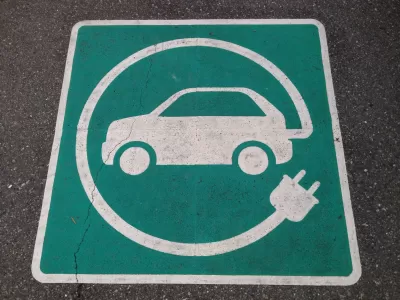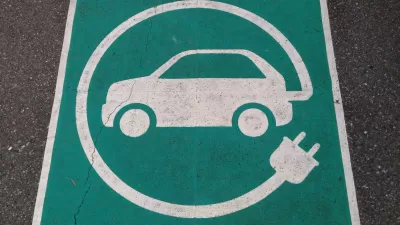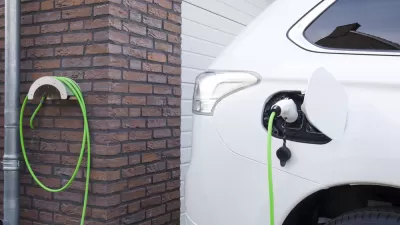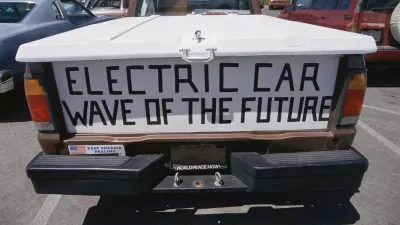Colorado will join California and nine other states in requiring that a percentage of new light-duty vehicle sales are zero-emissions, thanks to the first executive order signed by Democratic Gov. Jared Polis on Jan. 17.

The executive order directs the Colorado Department of Public Health and Environment to develop a Colorado Zero Emission vehicle program and propose it to the Air Quality Control Commission no later than May 2019.
According to a 9News Video, the new standard would need to be in place by the end of October. A few years later, 10 percent of all light-duty vehicles sold would be required to be electric or zero-emissions, states the new Public Health and Environment director, Eagle County Commissioner Jill Ryan.
"Colorado already does plenty to encourage electric and other low-emission vehicles — from a $5,000 tax credit [highest in the nation] to a program that builds fast-charging stations along highways — but Gov. Polis said it isn't enough if the state wants to have nearly 1 million electric vehicles in operation by 2030, a goal set by Polis' predecessor, former Democratic Gov. John Hickenlooper, a year ago," reports Ernest Luning.
Citing his pledge to fight climate change by moving the state toward all-renewable electric power by 2040, Polis said [at Thursday's press conference in Denver's Lower Downtown neighborhood at an electric vehicle (EV) charging station] the order will make it easier for residents to adopt electric vehicles while saving consumers money and providing widespread public health benefits.
The move to make Colorado a zero-emission vehicle or "ZEV" state is expected to encourage automakers to make more electric vehicle models available in Colorado, where dealers currently only carry around half the models available in states like California.
According to the Center for Climate and Energy Solutions (C2ES), "[a]s of December 2018, nine states have adopted both California's Zero Emission Vehicle (ZEV) program as well as the Low-Emission Vehicle (LEV) standards.: Connecticut, Maine, Maryland, Massachusetts, New Jersey, New York, Oregon, Rhode Island, and Vermont.
These nine “ZEV states” are following California’s lead in requiring automakers to produce ZEVs to improve local air quality and reduce the emissions contributing to climate change
On vehicle emission standards, California has unique authority under Section 209 of the Clean Air Act to maintain motor vehicle emission standards that are stricter than the federal standards, as long as the federal government has issued a waiver.
The executive order "also steers the remaining proceeds from the state's $70 million emissions-fraud settlement with Volkswagen toward 'electrification of transportation,' including helping pay for public transit vehicles, school buses and trucks," adds Luning.
Auto dealers not pleased
"Noting that three-quarters of Colorado's passenger vehicles are pickup trucks and sport utility vehicles, Tim Jackson, president and CEO of the Colorado Automobile Dealers Association, said in a statement that 'Colorado's challenging driving conditions' aren't as suited to electric vehicles as other states," writes Luning.
In addition, Senate Republican leaders called the executive order an interference with the free market, but there was one notable exception, state Sen. Kevin Priola of Henderson, who, like Gov. Polis, arrived at the press conference in an EV.
Priola is a lead sponsor of bipartisan legislation to set rules so utilities can build charging stations around the state, encouraging electric vehicle drivers to conquer what he called the last remaining obstacle — "range anxiety."
Former California Gov. Jerry Brown signed two executive orders to increase sales of electric vehicles. During his second year in office in 2012, the Democratic governor signed an executive order calling for 1.5 million ZEVs on the road by 2025. Last January, he raised the bar to 5 million by 2030.
However, executive orders don't have the same strength as statutes. California legislation considered in 2016 that would have required that 15 percent of new light-duty vehicles sold in the state be emissions-free by 2025 died amidst opposition from automakers.
Hat tip to Annie Dawid.
FULL STORY: Polis promotes electric, zero-emission vehicles with executive order (VIDEO)

Alabama: Trump Terminates Settlements for Black Communities Harmed By Raw Sewage
Trump deemed the landmark civil rights agreement “illegal DEI and environmental justice policy.”

Study: Maui’s Plan to Convert Vacation Rentals to Long-Term Housing Could Cause Nearly $1 Billion Economic Loss
The plan would reduce visitor accommodation by 25% resulting in 1,900 jobs lost.

Planetizen Federal Action Tracker
A weekly monitor of how Trump’s orders and actions are impacting planners and planning in America.

Wind Energy on the Rise Despite Federal Policy Reversal
The Trump administration is revoking federal support for renewable energy, but demand for new projects continues unabated.

Passengers Flock to Caltrain After Electrification
The new electric trains are running faster and more reliably, leading to strong ridership growth on the Bay Area rail system.

Texas Churches Rally Behind ‘Yes in God’s Back Yard’ Legislation
Religious leaders want the state to reduce zoning regulations to streamline leasing church-owned land to housing developers.
Urban Design for Planners 1: Software Tools
This six-course series explores essential urban design concepts using open source software and equips planners with the tools they need to participate fully in the urban design process.
Planning for Universal Design
Learn the tools for implementing Universal Design in planning regulations.
Caltrans
Smith Gee Studio
Institute for Housing and Urban Development Studies (IHS)
City of Grandview
Harvard GSD Executive Education
Toledo-Lucas County Plan Commissions
Salt Lake City
NYU Wagner Graduate School of Public Service





























